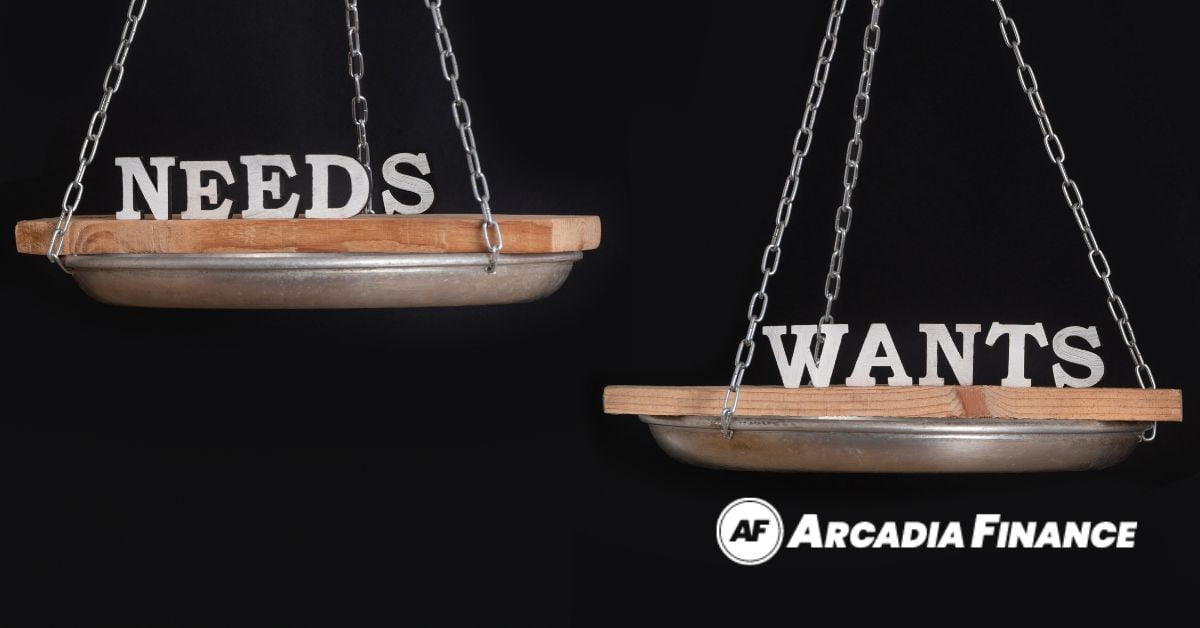
In our daily lives, we are constantly faced with decisions about what we need versus what we want. However, understanding the difference between these two concepts is not always straightforward. Needs and wants are terms that are often used interchangeably, but they have distinct meanings.
Needs
Essential for our survival and general well-being, needs are things that we cannot live without, and they are often based on our biological, physiological and psychological requirements. Here are some examples of needs:
- Food. We need food to provide our bodies with the necessary nutrients for energy, growth and repair.
- Water. We need water to keep our bodies hydrated and to help regulate our body temperature.
- Shelter. We need shelter to protect ourselves from the elements and to provide a safe and secure living environment.
- Clothing. We need clothing to protect ourselves from the weather and to maintain our personal hygiene.
- Healthcare. We need access to healthcare to maintain our physical and mental health.
- Education. We need education to develop our knowledge and skills and to enhance our ability to participate in society.
- Safety. We need safety to protect ourselves from harm and to maintain a sense of security.
These needs are based on Maslow’s hierarchy of needs, which suggests that our needs must be met in a certain order. For example, we must first meet our physiological needs, such as food and water, before we can fulfill our safety needs, such as shelter and security. Once our basic needs are met, we can move on to meeting our higher-level needs, such as social and self-actualisation needs.
Understanding your needs is important because it allows you to prioritise your resources, such as time and money. By meeting our basic needs first, we can ensure our survival and well-being and then move on to fulfilling our higher-level wants.
Wants
Wants are things that we desire but are not essential for our survival or health. They are often based on our personal preferences, social and cultural influences and marketing and advertising. Here are some examples of wants:
- Entertainment. We may want to go to the movies, concerts or sporting events for leisure and enjoyment.
- Luxury goods. We may want expensive clothing, jewellery or electronics for their aesthetic appeal or as status symbols.
- Travel. We may want to travel to different places for adventure, cultural experiences or relaxation.
- Hobbies. We may want to pursue hobbies such as art, music or sports for personal fulfillment and enjoyment.
- Socialisation. We may want to spend time with friends and family or attend social events for companionship and social interaction.
- Career advancement. We may want to advance in our careers or pursue new opportunities for personal and professional growth.
Our wants are often influenced by advertising and marketing which involves persuasive techniques to create a desire for products or services. For example, advertising may create a sense of urgency, scarcity or exclusivity to make us believe that we need a particular product or service to be happy or fulfilled.
» Discover: Practical Tips for Smarter Budgeting!
Understanding the Difference
Understanding the difference between our needs and wants is crucial because it allows us to organise our resources effectively. Here are some ways to understand the difference between needs and wants:
Importance of prioritising needs over wants
Our needs are essential for our survival and well-being, and they should always come first. By meeting our basic needs first, we can ensure our future well-being and avoid financial hardship.
Identifying and distinguishing between needs and wants
One way to identify your needs and wants is to ask yourself whether a particular item or service is necessary for your survival. For example, you may need a reliable car to get to work, but you may want a luxury car for its aesthetic appeal.
Consequences of mistaking wants for needs
Mistaking your wants for needs can lead to financial difficulties and undue stress. It is important to distinguish between your needs and wants to allocate your resources more effectively.
About Arcadia Finance
Obtain your loan with ease through Arcadia Finance. No application charges, and pick from 10 reputable lenders, all in adherence to South Africa’s National Credit Regulator guidelines.
Balancing Needs and Wants
Here are some strategies for balancing your needs and wants:
The role of budgeting: Creating a budget is an effective way to balance your needs and wants. By setting aside a specific amount of money for your needs and wants, you can ensure that you are meeting your basic needs first and then satisfying your wants.
Prioritising needs while satisfying wants: It is possible to satisfy your wants while still prioritising your needs. For example, you can choose to buy a reliable used car instead of a luxury car to satisfy your transportation needs while still saving money.
Importance of self-control and delayed gratification: It is important to practice self-control and delayed gratification to avoid overspending and mistaking your wants for needs. By delaying gratification and saving up for your wants, you can avoid financial difficulties.
Balancing our needs and wants requires mindfulness and conscious decision-making. We should prioritise our needs first and then satisfy our wants, rather than the other way around. By creating a budget, prioritising our needs while still satisfying our wants and practicing self-control and delayed gratification, we can ensure that we are living a fulfilling and satisfying life. It is important to remember that our needs and wants may change over time, and we should be flexible and adaptable in our decision-making.
Conclusion
Understanding the difference between your needs and wants is crucial to ensure that you are allocating your resources effectively and living a fulfilling life. Your needs are essential for your survival and well-being, and they should always come first. By meeting your basic needs first and then satisfying your wants, you can avoid financial difficulties and ensure long-term overall well-being.
FAQs
One way to differentiate between your needs and wants is to ask yourself whether a particular item or service is necessary for your survival or well-being. For example, you may need a reliable car to get to work, but you may want a luxury car for its aesthetic appeal. By focusing on your needs first and then satisfying your wants, you can ensure that you are allocating your resources adequately.
Yes, our wants can become our needs over time due to social and cultural influences as well as changes in our personal preferences. For example, owning a smartphone was once considered a want, but it has now become a need for many people due to its functionality and social connectivity.
One way to balance your needs and wants without overspending is to create a budget. By setting aside a specific amount of money for your needs and wants, you can ensure that you are meeting your basic needs first and then satisfying your wants. You can also prioritise your needs while still satisfying your wants by choosing less expensive options or by delaying gratification.
Mistaking your wants for needs can lead to financial difficulties, unnecessary stress and other negative consequences. By prioritising your wants over your needs, you may overspend and neglect your basic needs, which can lead to debt, financial hardship and other problems.
Yes, Maslow’s hierarchy of needs can help you classify your needs and wants by illustrating the importance of meeting your basic needs first. According to Maslow, our needs must be met in a certain order, starting with our physiological needs, such as food and water, and then moving on to our safety, social, esteem and self-actualisation needs. By understanding the hierarchy of needs, you can prioritise your resources effectively and ensure your long-term welfare.
Cheap loan - fast, uncomplicated, trustworthy
At Arcadia Finance you can compare loan offers from several lenders without obligation - free of charge and without any Schufa check. This gives you an overview of your options and allows you to choose the best offer.
Fill out our form now and compare interest rates at over 20 banks - transparently and quickly.

